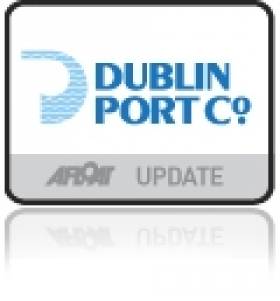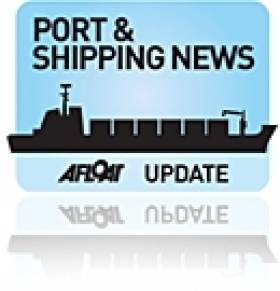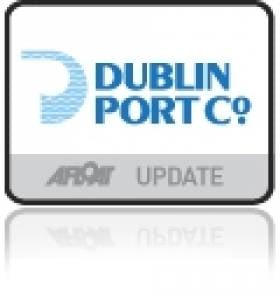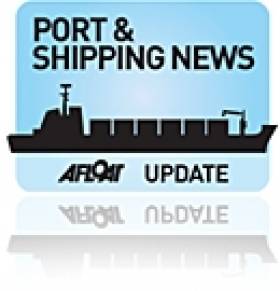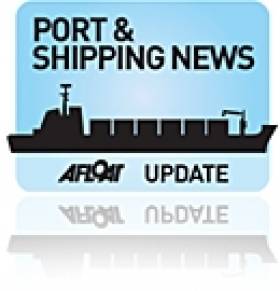Displaying items by tag: Leo Varadkar T.D.
Minister Appoints Frater to Board of Dublin Port
#DUBLIN PORT – Leo Varadkar, Minister for Transport, has appointed James Frater to the board of the Dublin Port Company.
The Irish Times reports that the Scot has held senior positions at ports in the UK, Hong Kong and Oman.Dublin Port is the country's largest such facility, handling roughly half of the State's trade.
Competition Authority to Examine Irish Ports
#PORTS & SHIPPING – Irish Ports are to be reviewed by an in-depth Government Plan to see how funding expansion of the nation's ports can be carried out through the private sector. The Government have ruled-out selling strategic port facilities to fund such projects.
Transport Minister Leo Varadkar said that a study by the Competition Authority into Ireland's ports would also examine whether Dublin Port had an economically dominant position. Minister Varadkar said that "Dublin Port is hugely successful with 40% of our GDP going through it."
He said that "part of our study will look at whether it is profitable because it is dominant or because it is very competitive."
Minister Varadkar said that "Dublin Port is hugely successful with 40% of our GDP going through it" and added "part of our study will look at whether it is profitable because it is dominant or because it is very competitive."
For more on this story as reported by RTE News click HERE.
New €1.5m Rail-Spur for Dublin Port
The minister welcomed "the important investment by Dublin Port Company in its rail network. It will further enhance the attractiveness of the port as a destination for rail-based freight. The project represents a commitment on the part of Dublin Port Company and Iarnród Éireann to customers who want to move goods by rail".
The project took six months to complete and the public private partnership involved Dublin Port Company, Iarnród Éireann and the first customer of the new facility, International Warehousing and Transport (IWT).
IWT is a privately owned Irish logistics company, which already operates freight-trains to Ballina that are expected to increase from 4 to 5 trains per week in each direction as a result of this investment. The rail-operator believes that the service will save up to 5.5million road kilometres annually and reduce CO2 emissions by up to 2,750 tonnes.
The Irish Exporters Association also welcomed the development of the IWT freight operation at the new facility, where increased frequency in services will enhance Ireland's contribution to the European Union's modal shift aspirations from road to rail.
The Common User Terminal is also open to other shipping companies. Existing clients using the lo-lo container terminal operated by Burke Shipping Group through its subsidiary Portroe Stevedores are C2C Lines, APL, Coastal Containers, Evergreen, Gracechurch and OOCL . The terminal also has a ro-ro berth facility where CLdN /Cobelfret operate from on routes to Belgium and The Netherlands.
In addition to the Dublin-Ballina service the port exports 400,000 tonnes of lead and zinc concentrate from the freight customers Boliden/Tara Mines with 15 trains per week. The facility at Alexandra Basin Jetty is regularly served by vessels from Arklow Shipping Ltd, where the 2011 newbuild Arklow Field (2,998 tonnes) is currently berthed.
- Dublin Port
- Dublin Port Company
- Arklow Shipping Ltd
- Irish Exporters Association
- Port of Dublin
- Ports and Shipping News
- IEA
- Minister for Transport
- Ocean Pier
- Irish Rail
- Iarnrod Eireann
- Portroe Stevedores
- Dublin Port news
- IWT
- ASL
- Leo Varadkar T.D.
- Port of Dublin news
- Railfreight
- International Warehousing and Transport
- Alexandra Basin East
- Common User Terminal
- Burke Shipping Group
- Clnd Cobelfret
- Boliden
- Tara Mines
- Arklow Field
- Dublin Shipping
- Lead mines
- Zinc mines
- Irish Railways
- Dublin Port railhead
Dublin to Manage Dundalk Port
"In order to ensure the orderly management of the company's affairs, I have decided that the best course of action is to transfer responsibility for the port to Dublin Port Company. I would be hopeful that port activities will continue at Dundalk following the transfer.
He added, once the current difficulties are overcome, it may be the case that Dundalk Port can return to local control, in cooperation with the local authority and private sector operators.
To amalgamate the two port companies a Transfer Order will be made under the Harbours Act 1996. In addition a draft order has to be approved by both Houses of the Oireachtas before being signed into law which is expected to take place within the coming weeks.
The Co. Louth port which is equidistant between Dublin and Belfast, has shown to have a long history as an independent seaport. However the recession has had a significant impact making trading conditions particularly difficult for the company. At its peak in 2006 there were over 220 vessels calling at the port but dropped to just over 60 vessels last year. Figures for 2011 show no signs of improvement.
Vessels of up to 3,500 dwt and 106m in length can be handled at the port's six berths. Unusally for an Irish port vessels can be seen resting on the mudbank subject to the state of the tide. The port is some 8kms from the open sea and is reached along a narrow channel which requires the compulsory use of a pilot.
Varadkar Warns of No Bail-Out to State-Owned Ports
In the report it was noted that there are too many ports and that the sector would benefit from a rationalisation of ownership and management structures. The decision which will be made over the next few months not only concerns the fate of the capital port but also the following state-owned ports: Dun Laoghaire, Waterford, Drogheda, Dundalk, Cork, Shannon Foynes, Wicklow, New Ross and Galway.
Mr Varadkar also warned that state money wouldn't be made available to bolster ports' balance sheets. "Where port companies are not successful, there will no bailouts and there will be no state aid. "It just isn't possible for the Government in the situation it's in to offer that," he said.
"Where smaller ports find themselves unable to continue operations, amalgamations or transfers to local authorities will be the preferred option."
On the issue of selling Dublin Port the company's chief executive Mr. Eamon O'Reilly who has cited previously that the port should not be sold as a private operator would not have the same incentive to invest as they would be focusing on generating returns.
As for the masterplan, he emphasised that the port would need to double its capacity so to handle the expected trade levels by 2040. He conceded the masterplan will cause some controversy but said the port has "great potential" to facilitate economic growth and make Dublin a better city to live in.


























